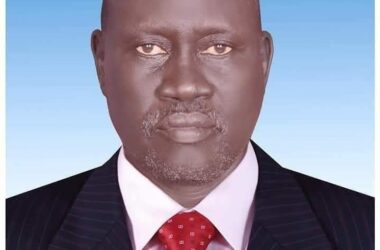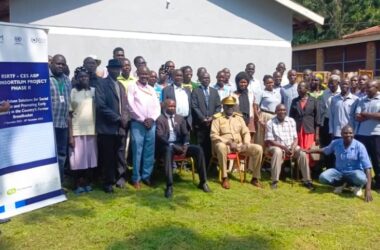
By William Madouk Garang
Public awareness and consultation report on the Nile waters will now be tabled before the Council of Ministries for deliberation in the nearest future; this is according to President Salva Kiir’s directives.
The Minister of Presidential Affairs, Dr. Barnaba Marial Benjamin on Friday received a compiled document of last month’s consultation forum that contains a number of recommendations on dredging and digging of Jonglei Canal.
After receiving the report he said: “H.E. President Salva Kiir Mayardit has directed him [Marial] to present the report to the Council of Ministers for deliberations”.
President Kiir suspended the dredging and digging of Jonglei Canal on the eve of Independence Day – July 9 and he instead directed that credible and independent environmental and social assessment be undertaken to find out the viability.
The decision came after a backlash from citizens over the controversial dredging project of the River Naam and Bahr el Ghazal Basin. The President however tasked a committee to organize a public awareness forum involving experts, government officials and members of public in Juba.
Consultation forum that focused on scientific approach of water management and wetland was conducted under the theme: “No Life without Water: Develop and Manage the White Nile Water Resources and the Sudd Wetlands Sustainably”.
“This report is an information and action-oriented document that provides an independent comprehensive set of recommendations, way forward, and lessons learnt to support the R-TGoNU on the contentious issues of dredging and resumption of Jonglei Canal which are perceived to have detrimental impacts on the Sudd Wetlands, and the White Nile River and its tributaries,” read part of statement on the Presidential page.
President’s office said the report was produced by the Secretariat and Editorial Team of the Sudd Wetlands and the White Nile Water Resources Development and Management Initiative (SWWDMI).
The committee is led by the Chairperson, Akoc Akuei Manheim and deputized by David John Kumuri.
15 recommendations in compiled report
In mid-July, the public consultation on the Nile water and management had called for credible feasibility studies before dredging of the Nile tributaries takes place. And it also suggested for establishment of the national water commission that will focus on regional and international issues.
1. The committee recommended the stoppage of the dredging initiative until credible feasibility studies are conducted.
2. Both executive and parliament should form an all-party parliamentary committee for water to focus on the adoption of policies, strategies, and action plans on the White Nile Water use, development management and control.
3. Appoint a legal advisor to the Ministry of Water Resources and Irrigation to report functions to the ministry of Justice and Constitutional Affairs.
4. Advocate for the establishment of the national water commission that will focus on regional and international issues as they relate to South Sudan.
5. There is a need for national records and archives on water resources, parliament should deliberate and pass relevant laws on this.
6. The lawmaker should give Nile Water development and management special attention during the upcoming constitutional making process.
7. Approve and adopt a permanent constitution, provision and national legislation on the use, development, management and control of the Nile Waters and its tributaries and ecosystem as well as Sudd region and its ecosystem.
8. There is a Need for deliberation and the passing of the bill for South Sudan to join the Nile Basin on the initiative with the ratification of CTA.
9. Establish a commission for scientific research on environmental and social assessment on the impact of the Jonglei Canal on the White Nile Waters and ecosystem in the Sudd region affected population, fisheries, livestock and wildlife.
10. Good policies are implementable without adequate financial resources. Hence, there is a need for adequate national funding and budget for water resources and development management related activities.
11. There is a need to establish water development and management related institutions to focus on the capacity building of national experts and policymakers.
12. Investment and consultation with the flood-affected populations and host communities, particularly in their relocation program.
13. Commission the studies on the feasibility of artificial lakes from rainwater in South Sudan in combating floods in the short term.
14. There is a need for the reconstruction of Rubkona Bridge to low water passage.
15. Women inclusion in all the process because women and girls are affected differently by climate change, drought and floods (35% affirmative action.


